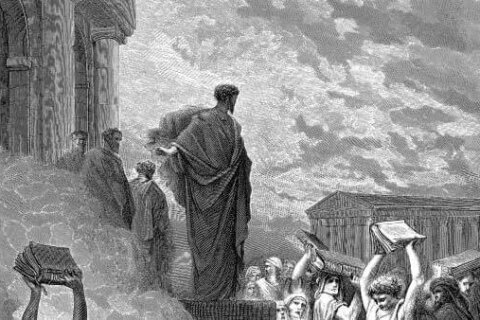“And he shall send Jesus Christ, which before was preached unto you: Whom the heaven must receive until the times of restitution of all things, which God hath spoken by the mouth of all his holy prophets since the world began.”
Acts 3:20–21
Restitution signifies the bringing back to a good state from what had been a bad one. It means to make good, to repay something stolen, to restore, to make an end of, and to satisfy a debt. The inspired prophet addressing the multitudes at Jerusalem on the Day of Pentecost recognized the need for a coming day of restitution when the wrongs of history could be addressed. Along with all God’s holy prophets who had prophesied since time began, he looked forward to the time (the original Greek suggests a period or space of time) when that restitution would be fulfilled. Crimes long perpetrated against humanity would be judged and labeled properly for what they had been, so that a reckoning could take place. That which had been lost and that which had been stolen would, through divine enforcement, be given back and restored.
Among the oppressions men have practiced against one another throughout every age since the dawn of time, are untold examples of cruelty beyond one’s power to describe or enumerate. Yet, perhaps no oppression has been so systematic, so diabolical, so lasting and painful in the trauma it inflicted, and yet so subtle and devious in form, as the oppression of stolen identity. The identity of individuals has been attacked. The identity of families has been attacked. The identity of entire nations has been attacked. And too often it has been done intentionally and systematically. Trouble began for the human family when a man and a woman stepped outside of the identity God had given them; and trouble has perpetuated under every circumstance in which people’s sense of identity has been lost.
The strife that exists between any two or more subgroups within the human family stems most often from people who have misunderstood or misappropriated their identity. A family who knows its identity and the identity and contribution of each of its members, is a family enabled to stand in power and unity.
One of the most barbaric forms this attack has taken is illustrated in the treatment of indigenous tribes in Canada. As if the robbery of their land had not been enough, government and “church” joined hands to rob the native people of their culture—“for their own good,” it was claimed. They criminalized education given by the indigenous home and community, and instead, forcibly and against the will of the parents, removed the children to prescribed government-owned schools, where they proceeded to strip them of their cultural identity in a systematic, degrading way. They cut their hair to a prescribed style. They gave them clothes of a foreign cut. They prohibited them from speaking their native language, singing their native songs, or engaging in the cultural customs which they loved. Worst of all, they schooled the children to look down on their own people. Lost without a sense of who they were or where they belonged, many were driven to drunkenness and despair.
This is but one of many examples in which one people oppressed another under the false illusion that they were superior in identity and could persecute a “lesser” people and overrun their culture with impunity. The African people, cruelly shipped from their native soil to destinations across the Americas, were stripped of their languages, of their names, of their customs, and, to some degree, of their expressions in music. (Alex Haley, in his book Roots, tells us slaves were not allowed to play drums for fear they would thereby “talk” to each other across distances as they had in Africa and thus enflame an uprising against their oppressors.)
Justifying their cause with false science, Europeans, labeling themselves white and Africans black, came to believe that the Africans were intellectually, socially, and morally inferior to themselves. This tragic belief gave excuse to any number of hostilities and outrages inflicted unjustly upon them. Likewise the Jews, chased from Germany and other parts of Europe by others attempting to achieve a “purer race,” were disposed of in concentration camps in the most inhumane manner.
While we dare not suggest that every nation has experienced the same pain or the same level of cruel and shameful subjugation, it is logical to think that every nation has been damaged through attacks upon their identity. The very fact that Europeans were labeled “white” and given the illusion of entitlement to privilege, was from a subtler angle a disabling attack on their identity. It was an attack because it isolated them from the very people who could have built them up through the shared richness of their differing culture. It was an attack because it enabled the carnal man to make animals and oppressors of men who had not been created to be beasts and oppressors. Because the attack was more subtle, the damage has, in many ways, been harder to rectify.
More recently, there has been a worldwide organized attack on individuals’ sexual identity. Hollywood and false media, who have long prescribed things like beauty, fashion, and strength in an ungodly and unnatural way, are now preaching the virtues of tolerance and inclusion in such a distorted form (allowing perversions from nature that ultimately hurt the person) that they actually victimize the very groups they profess to help. Too often, children given a false identity are plunged into social confusion and trauma at the most basic level, when all they needed was an understanding parent or mentor to guide them through their identity crisis and find peace in what God created them to be.
Religion—not all religion, but much of what has passed for religion—has itself helped to steal people’s identity, telling them they were not Christian until they behaved in a prescribed manner, often a melancholy manner, which God never created them to do. Entire subcultures have been given a false and oppressive religious identity (e.g. “Mennonite”), which effectively doomed them to a life of extreme isolation, cultural sterilization, and superstitious ignorance. In so doing, false religion has robbed men’s very souls. That is the farthest thing from what Christ came to do. Sin is everything that separates man from his God-given identity. Holiness restores man to what God created him to be. Carnality is in effect a vain imagination of myself, a false image reigning on the throne of my heart that oppresses me by my own consent. Sanctification is the possession of the Spirit of holiness that puts me in touch with my fathers, who in turn put me in touch with my God-given identity. Carnality takes me out of the image of God; the Holy Ghost restores me to the image of God. True religion resists sin because it is unnatural and reclaims the identity God created.
The world at large has been driven to a state of chaos, confusion, and moral ruin through misplaced loyalties and misplaced identity. God is calling for people to come out of confusion and to find their true identity through salvation from sin and connection with the fathers whom He has placed over them. Within God’s church, they join together with all the rest of the saved of the human family and make up together one perfect man (Eph. 4:13)—no carnal sects, no wrong labels or wrong joints, and no pressure to be who one is not. Each nation has its story, and each nation, in Zion, has its opportunity for revenge. The time of restitution puts people back in their place, and by this restoration, reconciles their history and heals their oppression.
Sources:
A. Everett, “Restitution,” 23 May 2015, West Milton, Ohio.
A. Haley, Roots, The Saga of an American Family (Da Capo Press, 2014), 288.





